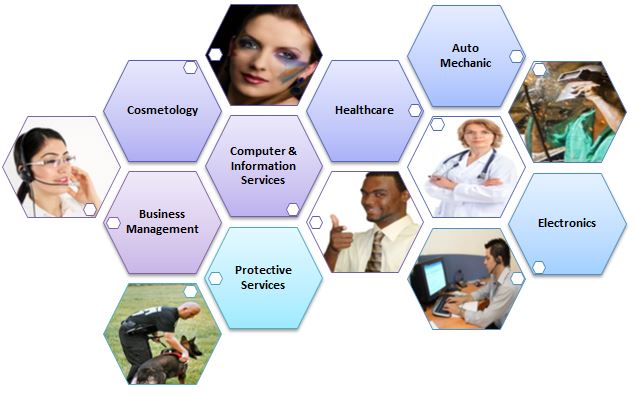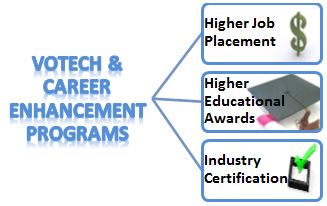Votech and Career Enhancement programs are a student’s stepping stone to improved job placement and higher educational awards. The second most popular type of educational program, vocational certificates have surpassed all other educational awards in popularity, except for bachelor’s programs.
 Vocational programs are viewed as cost-effective alternatives to higher educational awards, allowing students to further their education without risking so much wasted time and money. They are perfect for students who are not quite sure that post-secondary education is for them. They are equally perfect for students interested in a specific line of work.
Vocational programs are viewed as cost-effective alternatives to higher educational awards, allowing students to further their education without risking so much wasted time and money. They are perfect for students who are not quite sure that post-secondary education is for them. They are equally perfect for students interested in a specific line of work.
Auto mechanic and computer services students graduate prepared for higher job placement within their industry and typically see an immediate return on their educational expenses. On average, vocational and associates recipients earn about the same. However, there are some exceptions. It is not uncommon for vocational computer and information services’ students to earn fifty percent more than bachelor’s degree recipients.
These programs are designed for post-completion job placement. Then, there are vocational and technical programs designed to be a stepping stone to higher educational awards. For example, liberal studies students will not see the same immediate economic return as students in other vocations. Though, they will have a jump start toward earning a bachelor’s degree, the most popular educational award.
Bite-sized Awards
The vocational and technical classroom is a very hands-on experience and the awards are defined by their variety. Students may find themselves sitting in a desk for half the time, while the other half is spent doing hands-on training. These awards offer an education based on experience, whereas other degree programs are more focused on conceptual knowledge.
For this reason, vocational and technical programs tend to be offered in the form of academic certificates, which have shorter duration periods than other academic awards. Most can be completed within a year or two. Very few exceed two years in length. Students are ushered directly into knowledge intended to prepare them for a specific vocation or line of work.
Vocational classrooms are occupationally-oriented. Cosmetology students will earn certificates in a much different setting than that of students being trained in auto-mechanics. In a sense, these students get their hands dirty long before putting thier skills to use in the work place.

Skills Employers Want
With a variety of classrooms comes a variety of skills. Each vocational and technical program instills the time-management, problem-solving and technical skills students need for thier corresonding vocation. Again, these programs are defined by a hands-on approach, which gives these students a trained eye for detail within their field.
Like other academic awards, vocational and technical programs are designed to mold good communicators. Good communication skills are needed to work on a team, take charge and complete tasks on a deadline. A certificate in office management provides students the administrative skills needed to organize schedules, file and complete research. Whereas, vocational students in protective services understand how communication can be used to keep things in order outside the office. Backgrounds in psychology and criminology allow them to use thier skills as investigative and protective tools.
Under the communication skill set also sits customer service or the ability to effectively communicate with customers and sell a product. This is a very important skill to vocational students who may go into business for themselves. Based on industry experience, many of these programs equip students with the skills and knowledge necessary to run their own small business.
Improved Job Placement
 Vocational and technical jobs are as varied as the classrooms that teach their profession. Students, who do not begin thier own business, will find themselves working in settings very similar to the ones in which they were taught. Vocational programs are often viewed as a form of on-the-job training. Therefore, vocational students require very little extra-direction when hired within their field.
Vocational and technical jobs are as varied as the classrooms that teach their profession. Students, who do not begin thier own business, will find themselves working in settings very similar to the ones in which they were taught. Vocational programs are often viewed as a form of on-the-job training. Therefore, vocational students require very little extra-direction when hired within their field.
One of the most popular vocational fields, healthcare, prepares students for hospitals, nursing homes, spas, medical labs and pharmacies. Potentially earning a certificate in less than two years, healthcare students use vocational awards as a direct route into the workforce and industry-based certification.
Many vocations, such as healthcare and computer services, require employees to prove their expertise on industry-oriented exams. These are non-academic awards that prove students are up-to-date in their field and prepared for a specific job. Vocational and technical certificates are often used as a way to prepare employees for such exams or industry-based certifications. In this way, vocational programs can add value to existing degrees and benefit anyone, regardless of academic standing. Both a bachelor of healthcare recipient and registered nurse, without any previous post-secondary education, need the same industry-based certification.
